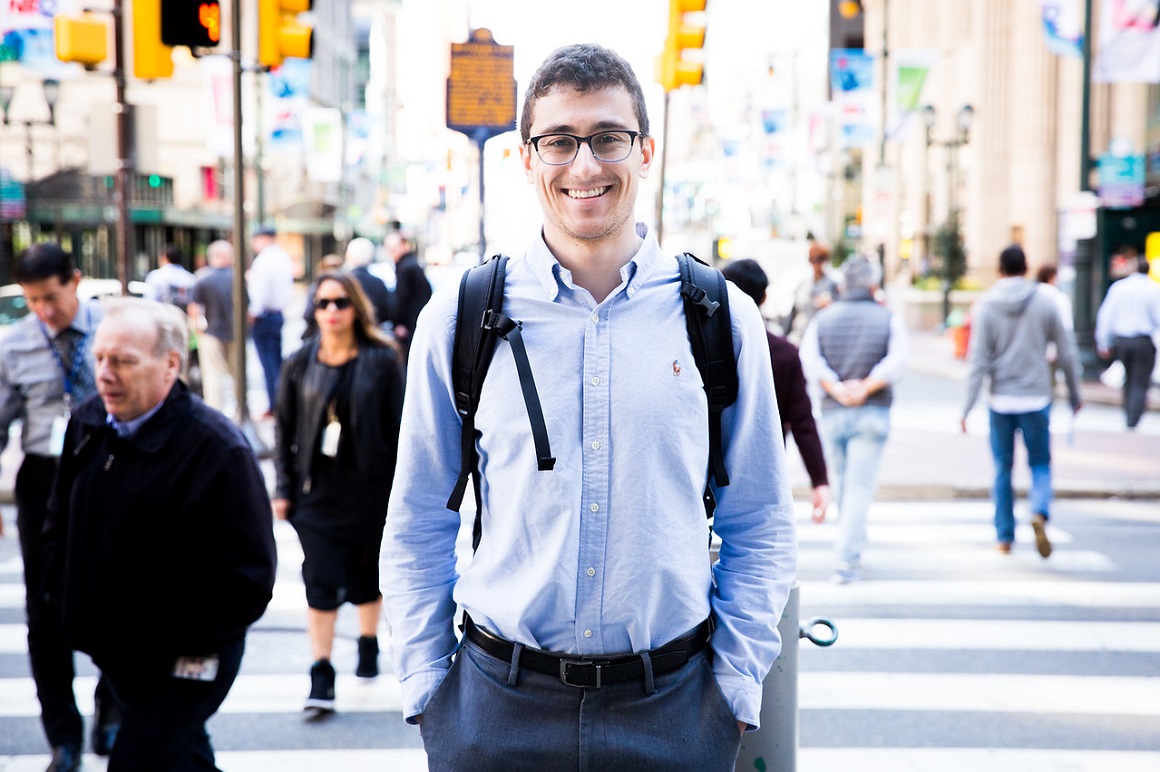Combining Cardiology and Public Health to Help Communities

October 25, 2019
MD/MPH student shares his experience in the dual program.
Markian Bojko, MD/MPH '20, intends to one day be a cardiothoracic surgeon and clinical researcher. His path to a career in health and medicine began as an undergraduate at Boston College studying physics. Since his family is from Ukraine, Bojko was excited to volunteer at a cardiothoracic surgery center in Ukraine where he had the opportunity to witness open-heart surgery. "This unique experience helped me determine that I wanted to pursue a career as a surgeon," he says.
Now in his third year of medical school at Drexel College of Medicine, as a student in the Dornsife School of Public Health's (DSPH), MD/MPH program, Bojko has expanded his career goals to include a desire to understand and improve public health. When not in class, Bojko can be found grading papers as a human physiology teacher’s assistant, biking to class, or volunteering at the Health Outreach Project (HOP), which is run by Drexel medical students. "HOP provides care to Philadelphians who lack access to care through free health clinics and services," he says.
His HOP experience reflects his understanding of the link between aspects of life outside of the clinical realm and health status. "I chose the MD/MPH program for both idealistic and practical reasons," Bojko explains. "The idealistic vision included my hope of having a greater impact on the health of my community beyond just my immediate patients. From a practical perspective, I wanted to gain confidence in my ability to design and initiate research projects."
Exploring Research Through Practice
Working under the guidance of Prashanth Vallabhajosyula, MD, associate professor of Surgery at the Hospital of the University of Pennsylvania, Bojko had an opportunity to further expand that understanding. In 2018, while working on his Dornsife Integrated Learning Experience (ILE), he studied patients with acute type A aortic dissections (ATAAD), a serious, often fatal, heart condition in which the inner layer of the aorta tears. Student projects like Bojkos', which focus on research or policy activities, are completed by all Dornsife MPH students. Penn Medicine is just one of the 86 partners (in 2019) who open their doors to Dornsife public health graduate students each year.
The objective of the study was to determine if a patient with a higher degree of aortic insufficiency (AI) at the time of ATAAD is at a higher risk of developing reoccurring AI at any time after the surgery. The study included approximately 500 patients. Following the advice of his advisor, Jana Mossey, PhD, MPH, MSN, professor emerita in the department of Epidemiology and Biostatistics at Dornsife, Bojko worked hard to determine the best approach to clean and prepare data for analysis, summarize descriptive statistics, build multivariable models, analyze missing values, and use propensity score matching to estimate the effects of the surgical intervention.
"I advised Markian to think like an epidemiologist and ask questions in critical ways," says Mossey. "MD/MPH, students look at a broader context than just biological characteristics when conducting research. For example, he questioned whether patients who are underinsured have worse post-surgery outcomes and if they had health care access issues; or, did the patient wait too long to seek medical attention resulting in a more complex surgical intervention and recovery?"
Ultimately, it was discovered that ATAAD patients do have a heightened risk of developing reoccurring AI, even years after surgery. "The data compiled will be useful for future research," says Bojko. Further underscoring the potential impact of the study, Bojko and the research team received national recognition for their work. "It is rewarding that the research has been well-accepted in the cardiothoracic surgery community," he says. “The work will be recognized at the American Association for Thoracic Surgery’s 99th annual meeting in Toronto where I will have the opportunity to present it."
As for his choice of pursing an MPH, in addition to his MD, Bojko says, "The program helped me attain specific skills that will undoubtedly help me in the future. I now feel confident that I can take a research idea and transform it into an answerable research hypothesis that may add to the current knowledge in the field and impact people's lives." Someday, he adds, he will volunteer again in Ukraine, only this time he will take his new knowledge to bring about positive changes in public health.
This story has been adapted from the Dornsife SPH Magazine - Spring-Summer 2019 issue.